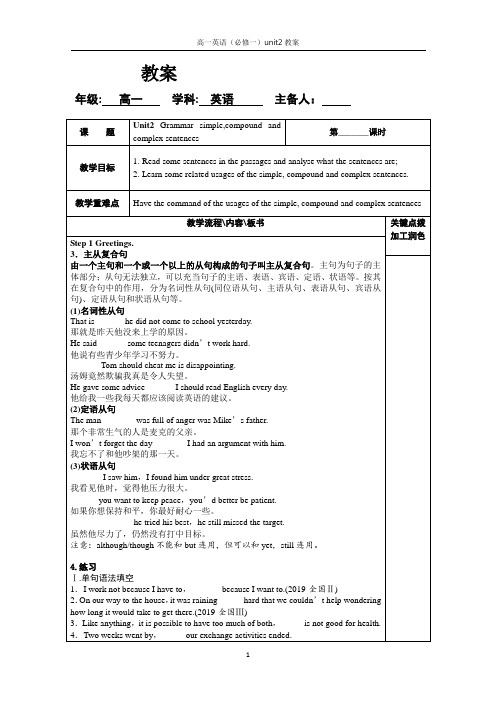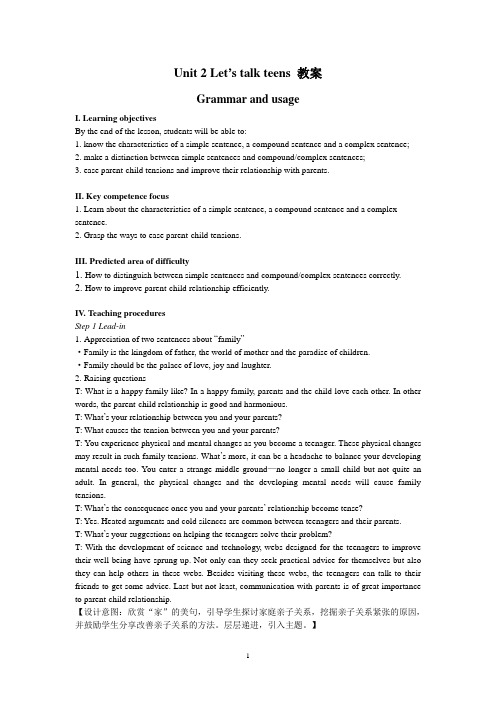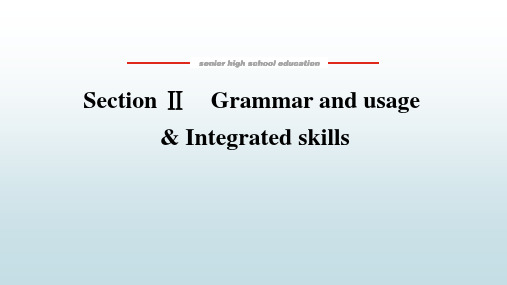牛津译林版英语必修一Unit2Grammarandusage2教案
Unit+2+Grammar+and+usage+课件-高中英语牛津译林版选择性必修第一册+

有一些动词短语也常跟动词-ing形式作宾语,如: insist on (坚持), object to (反对), be good at, lead to, leave off (停 止), put off (推迟), give up, look forward to , feel like(想要), devote to (把......奉献给),get used to (习惯于), pay attention to, can't help (禁不住), can't stand (受不了)等。
在他的国家,询问女士的年龄是不礼貌的
动词-ing 形式作主语
>1.动词 -ing 形式直接置于句首主语的位置上
Saying is easier than doing.
说比做容易。 2.动词-ing形式作主语时常后置,此时须用it 作形式主语,用形容词或名词(短语)作表语。
no useL,onreomgIoposudm, fun, hard work, a hard/difficult job 源自 a waste of time 等。
2.既可接动词-ing形式又可接不定式(短语)作宾语的动词:
begin, start, continue, like, dislike, love, prefer, mean , forget , remember , hate , regret 等。 (1)在 like, love, hate, prefer 等动词之后,用动词 -ing 形式或不定式意义上没有什么不同,只是侧重点有些不同,动词-ing形式表示 泛指的动作,不定式表示具体的一次性动作。 (2)在 begin, start, continue 之后,用动词 -ing 形式和不定式,意义无区别,尤其是 当主语是人的时候。
英语译林牛津版必修1 Unit2精品教案(7)[ 高考]
![英语译林牛津版必修1 Unit2精品教案(7)[ 高考]](https://img.taocdn.com/s3/m/ad721e832cc58bd63186bd64.png)
英语译林牛津版必修1 Unit2精品教案(7)Module 1 Unit 2 Growing painsPeriod Seven Grammar and usage (2)I. Teaching aims1. To make the students get familiar with attributive clauses.2. To have more practice on the usage of attributive clauses.II. Teaching important & difficult points1. How to identify and writhe attributive clauses.2. How to use correct relative pronouns.III. Teaching methodsGeneralization and transformation.IV. Teaching aidsA tape recorder and the multimedia.V. Teaching proceduresStep 1 Revision and Lead-in1. Check the homework with the students.2. In the last class, we learned how to use when, why and where as well as a preposition +which to introduce an attributive clause. Today we are going to do more exercise to consolidate what we learned.Step 2 Practice 11. We remember those days ____ we spent together.A. whenB. in whichC. in thatD. which2. We came to a place ____ they had never paid a visit before.A. whereB. whichC. thatD. to which3. If a shop has chairs ____ women can park their men, women will spend more time in the shop. (2005上海)A. thatB. whichC. whenD. where4. We have to make clear the material ____ this tool is made.A. whichB. thatC. of whichD. of that5. He was educated in a local grammar school, ____ he went on to Cambridge. (2005 山东)A. from whichB. after thatC. after whichD. from that6. Many people who had seen the film were afraid to go to the forest when they remembered the scenes ____ people where eaten by the tiger. (2005 广东)A. thatB. by whichC. whichD. in which7. Do you know the street ____ Mr Smith once lived?A. whichB. thatC. in thatD. on which8. He is the English teacher ____ we learned a lot.A. from whoB. himC. from himD. from whom9. -- Is that the small town you often refer to?-- Right, just the one ____ you know I used to work for years. (2005 福建)A. thatB. whichC. whereD. what10. The school themselves admit that not all children will be successful in the jobs ____ they arebeing trained. (2005江西)A. in thatB. for thatC. in whichD. for which11. Bamboo grows well ____ it is warm and wet all the year.A. in the placeB. in the place whereC. the place whereD. in which12. I often thought of my childhood ____ I lived on a farm.A. whichB. whereC. whenD. that13. Frank’s dream was to have his own shop ____ to produce the workings of his own hands. (2005湖南)A. thatB. in whichC. by whichD. now14. The reason ____ he got a bad cold is that he was caught in a heavy rain.A. whenB. whyC. whichD. in which15. The reason ____ he gave us was unacceptable.A. whichB. whyC. whereD. to which Keys: 1-5 DDDCC 6-10 DDDCD 11-15 BCBBAStep 3 Practice 2常用that做关系代词的几种情况:(1)先行词含有形容词最高级,序数词或者only, the very ,the best等做修饰语.(2)先行词为不定代词如no, all(指物),anything, nothing, little, much等.(3)先行词为人和物的名词词组.(4)当主句中的疑问词为which的情况下,为了避免重复,用that而不用which.不能用that的几种情况:(1)介词之后不用that.(2)不能用that引导非限制性定语从句.1. This is all ____ I know about the matter.A. thatB. whatC. whoD. whether2. Is there anything else _____ you require?A. whichB. thatC. whoD. what3. The last place _____we visited was the Great Wall.A. whichB. thatC. whereD. it4. He talked happily about the men and books_____ interested him greatly in the school.A. whichB. thatC. itD. whom5. There is no dictionary _____ you can find everything.A. thatB. whichC. whereD. in that6. This is one of the best books_______.A. that have ever been writtenB. that has ever been writtenC. that has writtenD. that have written7. He wrote a letter to me, telling me everything ___ he saw on the way to the Paris.A. whatB. thatC. whichD. where8. Is oxygen the only gas ____ helps fire burn?A. thatB. /C. whichD. it9. Is there anything _____ to you?A. that is belongedB. that belongsC. which belongsD. that belong10.The scientist and his achievements ______ you told me about are admired by us all.A. whichB. thatC. whoD. whose11.Which of the books ______ were borrowed from him is the best?A. whichB. whatC. thatD. whose12.D o you know who lives in the building ______ there’s a well?A. in front of itB. in front of whoseC. in front of whichD. in front of that13.I’ll never forget the day____ I joined the League.A. on whichB. in whichC. whichD. on that14. Mark was the only one of the students who invited by the headmaster.A. isB. wasC. wereD. wasKeys: ABBBC, ABABB, CCADStep 4 SummaryTo understand attributive clause better and use them correctly, we should be able to identify which word is the antecedent and what it functions as in an attributive clause, so that we can use a proper relative pronoun to introduce an attributive clause.Step 6 Homework1. Review the contents in this period.2. Preview the Task. Postscripts:。
Unit+2+Grammar+and+usage+教案 高中英语牛津译林版(2020)必修第一册

教案年级: 高一学科: 英语主备人:课题Unit2 Grammar simple,compound andcomplex sentences第_______课时教学目标1.Read some sentences in the passages and analyse what the sentences are;2. Learn some related usages of the simple, compound and complex sentences.教学重难点Have the command of the usages of the simple, compound and complex sentences教学流程\内容\板书关键点拨加工润色Step 1 Greetings.3.主从复合句由一个主句和一个或一个以上的从句构成的句子叫主从复合句。
主句为句子的主体部分;从句无法独立,可以充当句子的主语、表语、宾语、定语、状语等。
按其在复合句中的作用,分为名词性从句(同位语从句、主语从句、表语从句、宾语从句)、定语从句和状语从句等。
(1)名词性从句That is ______ he did not come to school yesterday.那就是昨天他没来上学的原因。
He said ______ some teenagers didn’t work hard.他说有些青少年学习不努力。
_______Tom should cheat me is disappointing.汤姆竟然欺骗我真是令人失望。
He gave some advice ______ I should read English every day.他给我一些我每天都应该阅读英语的建议。
(2)定语从句The man _______ was full of anger was Mike’s father.那个非常生气的人是麦克的父亲。
新牛津译林版必修第一册Unit 2 Let's talk teens Grammar and u

Unit 2 Let’s talk teens 教案Grammar and usageI. Learning objectivesBy the end of the lesson, students will be able to:1. know the characteristics of a simple sentence, a compound sentence and a complex sentence;2. make a distinction between simple sentences and compound/complex sentences;3. ease parent-child tensions and improve their relationship with parents.II. Key competence focus1. Learn about the characteristics of a simple sentence, a compound sentence and a complex sentence.2. Grasp the ways to ease parent-child tensions.III. Predicted area of difficulty1. How to distinguish between simple sentences and compound/complex sentences correctly.2. How to improve parent-child relationship efficiently.IV. Teaching proceduresStep 1 Lead-in1.Appreciation of two sentences about “family”·Family is the kingdom of father, the world of mother and the paradise of children.·Family should be the palace of love, joy and laughter.2.Raising questionsT: What is a happy family like? In a happy family, parents and the child love each other. In other words, the parent-child relationship is good and harmonious.T: What’s your relationship between you and your parents?T: What causes the tension between you and your parents?T: You experience physical and mental changes as you become a teenager. These physical changes may result in such family tensions. What’s more, it can be a headache to balance your developing mental needs too. You enter a strange middle ground—no longer a small child but not quite an adult. In general, the physical changes and the developing mental needs will cause family tensions.T: What’s the consequence once you and your parents’ relationship become tense?T: Yes. Heated arguments and cold silences are common between teenagers and their parents.T: What’s your suggestions on helping the teenagers solve their problem?T: With the development of science and technology, webs designed for the teenagers to improve their well-being have sprung up. Not only can they seek practical advice for themselves but also they can help others in these webs. Besides visiting these webs, the teenagers can talk to their friends to get some advice. Last but not least, communication with parents is of great importance to parent-child relationship.【设计意图:欣赏“家”的美句,引导学生探讨家庭亲子关系,挖掘亲子关系紧张的原因,并鼓励学生分享改善亲子关系的方法。
高中教育英语必修第一册译林版《1.2 Grammar and usage Iskills》教学课件

即学即练 单句语法填空 ①He gave me a __de_ta_il_ed___ (detail) description of his inner thinking. ②He makes a list of what is needed ____in____ detail in advance at the
4 base vt.以……为基础(依据) n.根据;基础;基底;总部,
大本营 base sth. on/upon sth. 以……为基础/根据 be based on/upon... 基于…… at the base of... 在……底部;在……基础上 basic adj. 基础的;基本的;根本的
归纳拓展 表示“由于,因为”的短语还有:due to, owing to, because of, thanks
to, on account of
即学即练 同义句转换 ①He worked very hard. As a result, he had his English improved. →He had his English improved_a_s_a _re_su_lt_of____ working hard. ②He was lazy so he failed. →He failed _a_s_a _re_su_lt_of____ his laziness. →He was lazy. __A_s a_r_es_ul_t ___,he failed. →His laziness __r_es_ul_te_d _in____ his failure. →His failure _r_es_u_lte_d_fr_om____ his laziness.
_fo_c_us_m_y_a_tte_n_tio_n_on_____ (把我的注意力集中在) study. ④We must __f_oc_us_o_n___ (关注) improving the quality of the products.
牛津译林版(2020)选择性必修一U2L3 Grammar and usage 教案

《英语》(选择性必修·第一册)Unit 2 The universal languageGrammar and usageI. Learning objectivesBy the end of the lesson, students will be able to:1. identify the use of verb-ing forms as subjects and objects;2. use verb-ing forms as subjects and objects in different situations;3. write a passage using verb-ing forms correctly.II. Key competence focus1. Identify the use of verb-ing forms as subjects and objects.2. Use verb-ing forms as subjects and objects in different situations.III. Predicted area of difficulty1. Use verb-ing forms as subjects and objects in different situations.2. Write a passage using verb-ing forms correctly.IV. Teaching proceduresStep 1 Lead-inT shows Ss some sentences with verb-ing forms as subjects and objects in the previous units and asks them to figure out the functions of these verb-ing forms.T: Hello, everyone. First, I’d like to show you some sentences with verb-ing forms in the previous units. Go through these sentences and figure out the functions of these verb-ing forms.·Sliding into the habit was easy, but it was difficult to quit the habit. (B3 U3)(verb-ing forms as subject)·We’ll come back more frequently and we’re also considering taking them to the city to live with us. (B2 U3)·As the largest rainforest in the world, the Amazon rainforest plays a significant role in maintaining the fine balance of the Earth’s ecosystem. (B3 U1)·I was used to checking the news and my friends’ social media updates every few minutes. (B3 U3)(verb-ing forms as objects) T: In the first sentence, “sliding into the habit” serves as a subject. In the next three sentences, the underlined parts function as objects.【设计意图:学生在之前的课文中,已经接触了一些verb-ing形式用作主语和宾语的句子。
高中教育英语必修第一册译林版《2.2 Grammar and usage》教学课件
核心突破·互动探究
►第一版块|重点词汇诠释 1 design vt.设计;构思;制订;计划;筹划 n.设计;设计艺术 (1)design sth. for sb./sth. 为某人/某物设计某物 be designed for... 为……而设计 be designed to do... 意欲做……,目的是…… be designed as... 被设计为…… (2)by design=on purpose 故意地 by chance=by accident 偶然地 (3)designer n. 设计师,构思者
possible
语气最弱
不用人作主语,常 用It作形式主语
It is possible (for sb.) to do sth. It is possible that...
经典例句 他将来有可能会创造一项世界纪录。 He is likely to set a world record in the future. It is possible for him to set a world record in the future. It is probable/possible/likely that he will set a world record in the future.
come. 我们刚从广播里听到一则警报说一场飓风可能到来。 ❹I'd likely have done the same thing in your situation. 我要是处在你这种情况,也有可能会做同样的事。
辨析比较 likely/probable/possible
易混词
语气强弱
主语
常用句型
places. 许多公共场所都有为残疾人设计的厕所。
牛津译林版英语必修一Unit2Grammarandusage2教案
牛津高中英语教学设计单元:Unit 2 Growing pains板块:Grammar and usageThoughts on the design:本节课是以读、写为主的语法教学课。
语法教学的方法各有不同,本节课的设计除了语言知识的传授外,还着眼于培养学生对于学习策略的掌握。
本节课按照“呈现——思考——归纳——巩固”的模式,在语言知识的传授过程中,强调让学生独立思考并归纳语言规则,从而掌握独立的学习策略。
此外,本节课在内容的选择上参考了05-08年各地高考题,对教学内容作了适当增补。
Teaching aims:After learning this session, the students will be able to grasp the basic rules for attributive clauses —relative adverbs used to begin attributive clauses. Besides, the students will be able to learn the studying strategy for language learning.Teaching procedures:Step 1Review what the students have learned in the previous class, and check the assignments.F ill in the blanks with “prep + relative porn”.1. Do you remember the day _________ we left you in charge? (on which)2. I often think of the moment _________ I saw the UFO. (at which)3. I remember the time _________ Eric won that speech competition. (at which)4. It rained the whole day __________ he traveled with his family. (on which)5. The police searched the house _________ the thief had stayed. (in which)6. Mike wants to work in a country _________ there are a lot of rainforests. (in which)7. This is not a family _________ bad behavior goes unpunished. (in which)8. The study is the place _________ I often have talks with my father. (in which)9. I won’t listen to the reason _________ you didn’t do your homework. (for which)10. This is the reason _________ my parents got home earlier. (for which)[Explanation]本步骤是对上一堂内容的回顾,并为下面教授新知识作铺垫。
译林版高中英语选必一Unit2 Grammar and usage (II) 教案(雅礼版)
Unit 2 The universal languageGrammar and usage (II)Verb-ing forms as subjects and objects◆内容分析:本板块围绕单元话题,引导学生在有关“伯牙遇知音”的语篇中观察、探究动词-ing做主语和宾语的用法,并自主归纳其核心规则;再让学生通过句子、语篇两个层面练习巩固所学、内化新知;最后要求学生正确使用目标语法写出自己最喜欢的音乐及理由。
◆教学目标:By the end of this section, students will be able to:1.identify the use of verb-ing forms as subjects and objects;2.work out the rules of verb-ing used as subjects and objects;e the right forms of verb-ing to finish tasks of writing sentences and completingan article about his favorite music;4.apply verb-ing forms in new situations.◆教学重难点:1.To summarize the general rules;2.To apply the rules correctly and properly.动词-ing形式是动词的一种非谓语形式,包括现在分词和动名词两种。
动词-ing形式的时态和语态二、动词-ing形式作主语1.动词-ing形式直接作主语表示抽象的概念,通常直接置于句首,谓语动词用单数形式。
e.g.Reading aloud is a good way in learning a language.朗读是学习语言的一个好办法。
Getting up early is a good habit.早起是一种好习惯。
Unit 2 Grammar and usage 课件-高中英语牛津译林版(2020)必修第一册
他们要去和人打架。 They are going to have a fight with someone.
他们要去和人打架,但是我不知道为什么。 They are going to have a fight with someone, but I don’t know why. I don't know why they are going to have a fight with someone.
Unit 2 Let's talk teens
Grammar and Usage
Simple, compound and complex sentences
Watch a video. Try to describe the scene!
• 我想知道他们要去和谁打
noun clauses
adverbial clauses
attributive clause
that, which, who, if, whether…
✓ When to use a comma before conjunctions:
Jack likes chicken, and he loves Nando's. Jack likes chicken, but he hates turkey.
These are both examples of compound sentences. In each example, each sentence features two independent clauses, not one. Note that there is now a comma before the “and” and the “but”.)
- 1、下载文档前请自行甄别文档内容的完整性,平台不提供额外的编辑、内容补充、找答案等附加服务。
- 2、"仅部分预览"的文档,不可在线预览部分如存在完整性等问题,可反馈申请退款(可完整预览的文档不适用该条件!)。
- 3、如文档侵犯您的权益,请联系客服反馈,我们会尽快为您处理(人工客服工作时间:9:00-18:30)。
牛津高中英语教学设计单元:Unit 2 Growing pains板块:Grammar and usageThoughts on the design:本节课是以读、写为主的语法教学课。
语法教学的方法各有不同,本节课的设计除了语言知识的传授外,还着眼于培养学生对于学习策略的掌握。
本节课按照“呈现——思考——归纳——巩固”的模式,在语言知识的传授过程中,强调让学生独立思考并归纳语言规则,从而掌握独立的学习策略。
此外,本节课在内容的选择上参考了05-08年各地高考题,对教学内容作了适当增补。
Teaching aims:After learning this session, the students will be able to grasp the basic rules for attributive clauses —relative adverbs used to begin attributive clauses. Besides, the students will be able to learn the studying strategy for language learning.Teaching procedures:Step 1Review what the students have learned in the previous class, and check the assignments.F ill in the blanks with “prep + relative porn”.1. Do you remember the day _________ we left you in charge? (on which)2. I often think of the moment _________ I saw the UFO. (at which)3. I remember the time _________ Eric won that speech competition. (at which)4. It rained the whole day __________ he traveled with his family. (on which)5. The police searched the house _________ the thief had stayed. (in which)6. Mike wants to work in a country _________ there are a lot of rainforests. (in which)7. This is not a family _________ bad behavior goes unpunished. (in which)8. The study is the place _________ I often have talks with my father. (in which)9. I won’t listen to the reason _________ you didn’t do your homework. (for which)10. This is the reason _________ my parents got home earlier. (for which)[Explanation]本步骤是对上一堂内容的回顾,并为下面教授新知识作铺垫。
Step 2Review the first four sentences of the assignments, using “when” to replace “prep+which”.1. Do you remember the day on which we left you in charge? (when)2. I often think of the moment at which I saw the UFO. (when)3. I remember the time at which Eric won that speech competition. (when)4. It rained the whole day on which he traveled with his family. (when)Then ask the students to think about the grammatical principles in the sentences, and then make a conclusion as follows: We often use the relative adverb “when” to begin attribu tive clauses after nouns like “time”, “moment”, “day”, “season”, “year”, etc.[Explanation]本堂课继续延用上堂课“练习——思考——归纳——巩固”的模式来传授新的知识。
Step 3Review the next four sentences of the assignments, using “where” to replace “prep+which”.1. The police searched the house in which the thief had stayed. (where)2. Mike wants to work in a country in which there are a lot of rainforests. (where)3. This is not a family in which bad behavior goes unpunished. (where)4. The study is the place in which I often have talks with my father. (where)Then ask the students to think about the grammatical principles in the sentences, and then make a conclusion as follows: We often use the relative adverb “where” to begin attributive clauses after nouns like “place”, “house”, “city”, “country”, “world”, etc.[Explanation]同上。
Step 4Review the last two sentences of the assignments, using “why” to replace “prep+which”.1 I won’t listen to the reason for which you didn’t do your homework. (why)2 This is the reason for which my parents got home earlier. (why)Then ask the students to think about the grammatical principles in the sentences, and then make a conclusion as follows: We use the relative adverb “why” to begin attributive clauses after “reason”. [Explanation]同上。
Step 5Ask the students to finish the following exercises as a consolidation. Meanwhile, use the exercises to explain the difficult point —the choice between relative pronouns and adverbs.“when” or “which”?1. I still remember the days ________ we stayed together in Beijing. (when)2. I still remember the days ________ we spent together in Beijing. (which)3. I still remember the days ________ we enjoyed ourselves in Beijing. (when)4. I still remember the days ________ we enjoyed in Beijing. (which)“where” or “which”?5. That blue house is the place ________ I lived yesterday. (where)6. That blue house is the place ________ I visited yesterday. (which)7. That blue house is the place ________ I paid a visit yesterday. (where)8. That blue house is the place ________ I paid a visit to yesterday. (which)“why” or “which”?9. Do you know the reason ________ he told me the news last week? (why)10. Do you know the reason ________ he told me last week? (which)11. Do you know the reason ________ he was late this morning? (why)12. Do you know the reason ________ he was late for this morning? (which)After finishing the exercises, ask the students to think about the common points in these sentences, then make a conclusion as follows: The choice between relative pronouns an d relative adverbs doesn’t depend on the antecedents before the attributive clauses, but on the verbs or verb phrases in the attributive clauses.[Explanation]此处继续延用前面的模式来解释学生学习定语从句的一个难点:关系代词与副词的选择。
